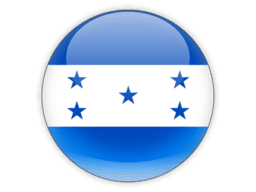
Regions of Honduras
Explore 18 regions
Cities of Honduras
Discover 50 cities across 17 regions
Atlántida Department(2)
Bay Islands(1)
Choluteca Department(4)
Colón Department(3)
Comayagua Department(2)
Copán Department(2)
Cortés Department(11)
El Paraíso Department(2)
Francisco Morazán Department(3)
Intibucá Department(2)
La Paz Department(2)
Lempira Department(1)
Ocotepeque Department(1)
Olancho Department(2)
Santa Bárbara Department(2)
Valle Department(3)
Honduras is a country located in Central America, bordered by Guatemala to the west, El Salvador to the south, Nicaragua to the southeast, the Pacific Ocean to the south, and the Caribbean Sea to the north. The country has a population of approximately 10.5 million people and its capital city is Tegucigalpa.
Honduras has a tropical climate with high humidity, and temperatures that vary from hot and humid in the lowlands to cooler in the mountains. The country has a diverse geography, including mountain ranges, rainforests, beaches, and coral reefs.
Honduras is known for its rich history and culture, which is a blend of indigenous, Spanish, and African influences. The country has many archaeological sites, such as the ruins of Copán, which are a UNESCO World Heritage site. Honduras is also known for its colorful traditional clothing, music, dance, and art.
Tourism is an important industry in Honduras, with visitors coming to enjoy the country's natural beauty, wildlife, and adventure activities such as rafting, hiking, and zip-lining. Popular tourist destinations include the Bay Islands, Roatán, and Copán.
However, Honduras is also known for its high crime rates, particularly in its urban areas. Visitors should take caution when traveling and take measures to ensure their safety, such as avoiding traveling alone at night, not displaying valuables, and being aware of their surroundings.
Telephone Code
504
Local Emergency Phone
Ambulance: 195, 37, 8654; Fire: 198; Police: 119
Vaccinations
An International Certificate of Vaccination for yellow fever is required for travelers arriving from countries with a risk of yellow fever transmission and for travelers having transited through the airport of a country with risk of yellow fever transmission. Suggested vaccinations: measles, rubella, rabies, hepatitis A, hepatitis B, typhoid. See WHO recommendations.
Climate
Subtropical in lowlands, temperate in mountains
Currency (Code)
Lempiras (HNL)
Electricity/Voltage/Plug Type(s)
120 V / 60 Hz / plug types(s): A, B
Major Languages
Spanish, Amerindian dialects
Major Religions
Roman Catholic 46%, Protestant 41%, atheist 1%
Potable Water
Opt for bottled water
International Driving Permit
IDP honored; be sure to check into an INTER-AMERICAN DRIVING PERMIT also issued by AAA
Road Driving Side
Right
Tourist Destinations
Bay Islands (includes Roatan, Utila); Copán Archeological Site; Mayan Sculpture Museum (Copan); Lago de Yojoa; Punta Sal; Rio Platano Biosphere Reserve
Major Sports
Soccer, baseball, tennis, swimming, basketball
Cultural Practices
It is common to turn one's head and purse lips in the direction one is pointing towards.
Tipping Guidelines
A tip of 10-15% of the bill at a restaurant is considered a good tip. Leaving the equivalent of $2-3 (USD) per night for housekeeping is acceptable.
Souvenirs
Mahogany wood carvings, cigars, leather goods, straw work, pottery, shell items, woven cloth hammocks, replica Mayan items and corn husk dolls, coffee
Traditional Cuisine
Plato típico — a variety of foods prepared separately, but forming a complete meal in the end; the dish consists of marinated and grilled beef, pork sausages and cracklings, fried plantains, stewed or refried beans, and rice; traditionally served with sour cream, fresh white cheese, avocado slices, marinated cabbage, lime juice, and small tortillas
Geography
Area
total: 112,090 sq km
land: 111,890 sq km
water: 200 sq km
Climate
subtropical in lowlands, temperate in mountains
Natural resources
timber, gold, silver, copper, lead, zinc, iron ore, antimony, coal, fish, hydropower
People and Society
Population
9,571,352 (2023 est.)
Ethnic groups
Mestizo (mixed Amerindian and European) 90%, Amerindian 7%, African descent 2%, White 1%
Languages
Spanish (official), Amerindian dialects
Religions
Evangelical/Protestant 48%, Roman Catholic 34%, other 1%, none 17% (2020 est.)
Population growth rate
1.16% (2023 est.)
Government
Government type
presidential republic
Capital
name: Tegucigalpa; note - article eight of the Honduran constitution states that the twin cities of Tegucigalpa and Comayaguela, jointly, constitute the capital of the Republic of Honduras; however, virtually all governmental institutions are on the Tegucigalpa side, which in practical terms makes Tegucigalpa the capital
Economy
Economic overview
second-fastest-growing Central American economy; COVID-19 and two hurricanes crippled activity; high poverty and inequality; declining-but-still-high violent crime disruption; systemic corruption; coffee and banana exporter; enormous remittances
Real GDP (purchasing power parity)
$57.273 billion (2021 est.)
Real GDP per capita
$5,600 (2021 est.)
Agricultural products
sugarcane, oil palm fruit, milk, bananas, maize, coffee, melons, oranges, poultry, beans
Industries
sugar processing, coffee, woven and knit apparel, wood products, cigars
Exports
$7.941 billion (2021 est.)
Exports - partners
United States 53%, El Salvador 8%, Guatemala 5%, Nicaragua 5% (2019)
Exports - commodities
clothing and apparel, coffee, insulated wiring, bananas, palm oil (2019)
Imports
$14.495 billion (2021 est.)
Imports - partners
United States 42%, China 10%, Guatemala 8%, El Salvador 8%, Mexico 6% (2019)
Imports - commodities
refined petroleum, clothing and apparel, packaged medicines, broadcasting equipment, insulated wiring (2019)
International Airports in Honduras
Discover 6 major airports serving Honduras
Mark Honduras as Visited
Add Honduras to your personal travel map and track your journey around the world. Share your adventures and see your progress grow!